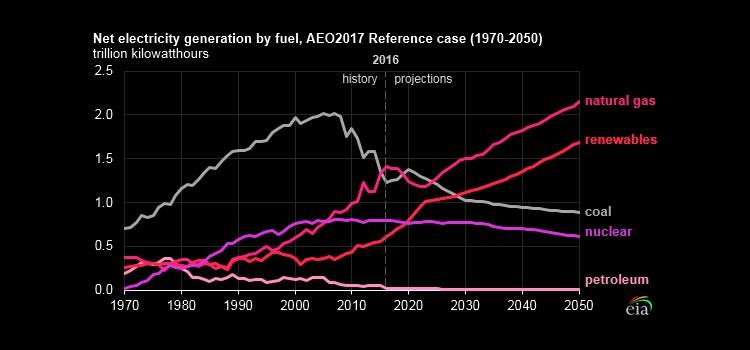
U.S. WILL LOSE NUCLEAR

WNN - The USA risks losing a substantial portion of its nuclear power capacity unless it takes policy action, International Energy Agency Executive Director Fatih Birol told the US Senate.
Addressing the Senate Energy and Natural Resources Committee on prospects for global energy markets, Birol said the USA had been a leader in nuclear power technology for 60 years alongside France, Japan and Russia, but was set to be overtaken by China unless US policies change. Birol has testified in front of the committee for the last three years.
"China has rapidly developed nuclear power over the past two decades, increasing from just three operating reactors in 2000 to 46 at the end of last year," Birol said. "Nuclear capacity in China is set to overtake that of the United States within ten years."
Birol praised US progress on capture, utilisation and storage (CCUS), but noted that nuclear still generates twice as much low-carbon electricity in the USA as wind and solar combined. The baseload capacity of nuclear power plants also plays a major role in maintaining electricity security, he said, especially in northern regions of the country which experience spikes in electricity and gas demand during extreme cold spells. Nuclear plants also provide frequency control and other system services, he added.
"That all said, nuclear in the US is facing major challenges," he said. "Without effective policy action the United States will be on track to lose a substantial proportion of its capacity. From my vantage point, this would be detrimental to both energy security and clean energy objectives."
Safeguard existing fleet
A first priority should be to safeguard the existing fleet by extending nuclear plant lifetimes "as long as safety considerations allow", he said, acknowledging that this presents a challenge in those parts of the USA with wholesale markets that do not value the energy security and clean energy contribution of nuclear.
To safeguard the long-term contribution of nuclear, the country must also continue to accelerate innovation in new nuclear technologies, including small modular reactors, Birol said. There is "significant international appetite" for such innovative technologies, which he said could be an opportunity for US innovation to play a "leading role".
Birol repeated these remarks during a joint press conference with US Energy Secretary Rick Perry, when he noted that an "ageing" fleet and "hesitation" on lifetime extensions would see US nuclear capacity decline from about 20% today to 7% by 2040, in the absence of policy changes. This, he said, would have "major implications for security of supply and the carbon footprint of the US power system".
During the press conference, Perry announced new plans for USD24 million of funding for projects to advance transformational CCUS technologies, which he said would allow the use of coal and natural gas with "near zero" emissions. He added however that nuclear would still play an essential role.
"We believe that you can't have a serious conversation about reducing emissions without including nuclear energy and carbon capture technologies," he said.
Perry also announced the launch of the Department of Energy's Versatile Fast Neutron Source, one of the foundational projects specified in the Nuclear Energy Innovation Capabilities Act of 2017. The facility, which is also known as the Versatile Test Reactor, will enable the USA to perform the accelerated irradiation testing needed by non-light water advanced reactor concepts.
-----
Earlier:

2019, February, 15, 11:50:00
BP ENERGY OUTLOOK 2019BP - The 2019 edition of BP’s Energy Outlook, published today, explores the key uncertainties that could impact the shape of global energy markets out to 2040. The greatest uncertainties over this period involve the need for more energy to support continued global economic growth and rising prosperity, together with the need for a more rapid transition to a lower-carbon future. |

2019, February, 8, 11:15:00
U.S. URANIUM PRODUCTION DOWNEIA - U.S. production of uranium concentrate (U3O8) in the fourth quarter of 2018 was 345,425 pounds, down 35% from the third quarter of 2018 and down 45% from the fourth quarter of 2017. During the fourth quarter of 2018, U.S. uranium was produced at six U.S. uranium facilities, one fewer than in the third quarter of 2018. |

2019, January, 14, 11:05:00
U.S. NUCLEAR FOR AFRICAISSUES - Yet the United States still has an opportunity to help interested African nations overcome the obstacles to realizing their energy ambitions. Whereas Russia and China have large government investments in a few advanced nuclear technologies, the United States has a robust and thriving private sector for advanced nuclear development, drawing on both decades of public research and development and a high-tech investment ecosystem. From large national laboratories to small venture-backed start-ups, the United States has over 50 firms working on a diverse portfolio of advanced nuclear designs, many targeting smaller or niche markets. |

2018, December, 24, 12:00:00
U.S. PRIMARY ENERGY PRODUCTION 8.0 QUADRILLION BTUU.S. EIA - U.S. primary energy production totaled 8.0 quadrillion British thermal units (Btu), a 10% increase compared with September 2017. |

2018, December, 21, 13:45:00
U.S. THERMONUCLEAR PARTICIPATIONWNN - The USA should continue its participation in the International Thermonuclear Experimental Reactor (ITER) project and develop a national research programme towards building a compact pilot plant, according to the National Academies of Sciences, Engineering, and Medicine (NASEM). |

2018, November, 16, 09:05:00
JAPAN, U.S. NUCLEAR COOPERATIONWNN - The countries intend to cooperate in areas including nuclear research and development, including innovative reactors. They plan to discuss mid- to long-term planning to create private sector-led innovation, as well as encourage the private sector and university researchers to develop advanced reactors. |

2018, November, 14, 11:45:00
U.S. NUCLEAR CAPEX DOWN 40.8%WNN - in 2017 the average total generating cost - which includes capital, fuel and operating costs - for nuclear energy was USD33.50 per megawatt-hour (MWh). |












